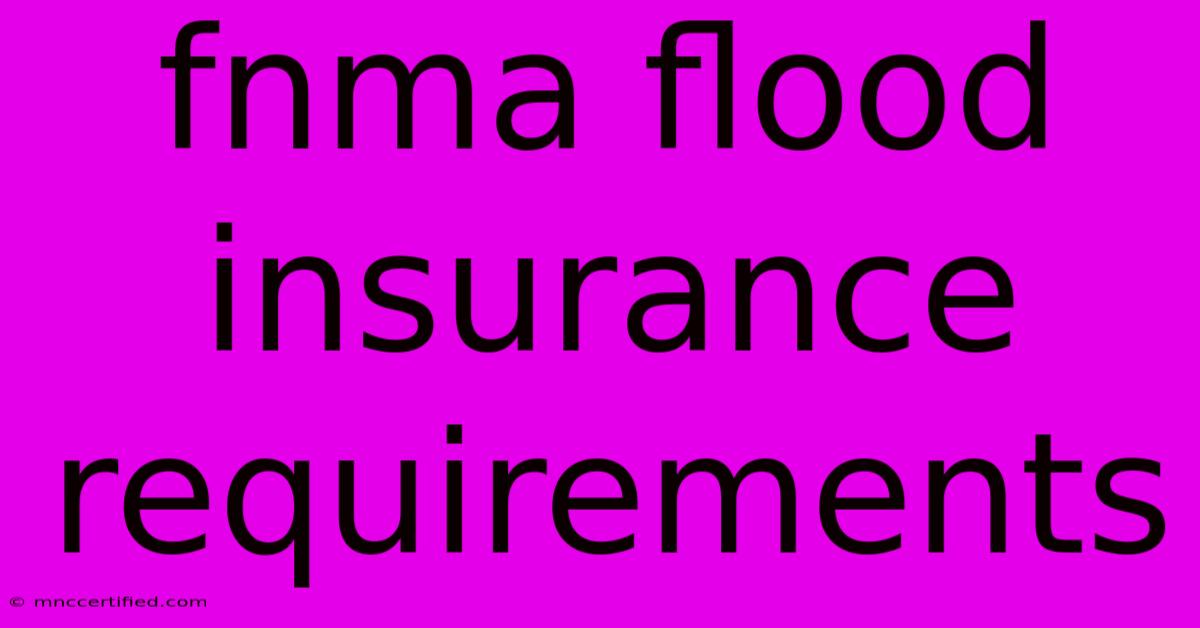Fnma Flood Insurance Requirements

Table of Contents
FNMA Flood Insurance Requirements: A Comprehensive Guide for Homebuyers and Sellers
Buying or selling a home can be a complex process, and understanding the intricacies of flood insurance is crucial, especially when dealing with Fannie Mae (FNMA) loans. This comprehensive guide will clarify FNMA's flood insurance requirements, helping you navigate the process smoothly.
What is FNMA and Why Do They Require Flood Insurance?
Fannie Mae (Federal National Mortgage Association) is a government-sponsored enterprise (GSE) that buys mortgages from lenders, thus freeing up capital for lenders to issue more loans. Because they back so many mortgages, FNMA plays a significant role in the stability of the U.S. housing market. They require flood insurance to mitigate risk. Flood damage can be catastrophic and incredibly expensive, potentially leaving both the homeowner and FNMA with significant losses. By requiring flood insurance, FNMA protects their investment and ensures borrowers can rebuild their homes in the event of a flood.
Determining Flood Risk: The Floodplain Factor
The cornerstone of FNMA's flood insurance requirements is determining whether a property lies within a high-risk flood zone or a Special Flood Hazard Area (SFHA). This is determined by FEMA (Federal Emergency Management Agency) flood maps. These maps identify areas with a statistically significant chance of flooding.
How to Check Your Property's Flood Risk:
- Visit the FEMA Flood Map Service Center: This online tool allows you to input your address and view your property's flood risk assessment. It will indicate whether your property is in an SFHA or a low-to-moderate risk area.
- Contact your local floodplain administrator: They can provide detailed information about your property's flood risk and any local ordinances related to flood insurance.
FNMA's Flood Insurance Requirements Based on Risk Level
FNMA's requirements vary depending on your property's flood risk designation.
High-Risk Flood Zones (SFHA):
If your property lies within an SFHA, flood insurance is mandatory for FNMA-backed mortgages. This usually means purchasing a flood insurance policy through the National Flood Insurance Program (NFIP) or a private insurer. The policy must meet FNMA's minimum coverage requirements, typically covering the mortgage amount.
Low-to-Moderate Risk Zones:
Properties outside of SFHAs are considered to be in low-to-moderate risk zones. While flood insurance isn't mandatory, it's often strongly recommended. FNMA may still require it depending on the lender’s risk assessment and other factors.
Key Aspects of FNMA-Compliant Flood Insurance:
- Policy Coverage: Ensure your policy covers the replacement cost of your home and personal belongings, at a minimum meeting the requirements set by your lender and FNMA.
- Policy Provider: While NFIP policies are commonly accepted, many private insurers also offer FNMA-approved flood insurance options. Compare policies to find the best coverage at a competitive price.
- Policy Renewal: Remember to renew your flood insurance policy on time to maintain continuous coverage. Lapses in coverage can lead to delays or complications with your mortgage.
- Proof of Insurance: You'll need to provide proof of flood insurance to your lender and FNMA throughout the life of your mortgage.
Consequences of Non-Compliance:
Failing to obtain and maintain the required flood insurance can have serious consequences. This can include:
- Mortgage denial: Your loan application may be denied if you don't meet FNMA's flood insurance requirements.
- Loan default: Failure to maintain flood insurance can be considered a breach of your mortgage contract, potentially leading to foreclosure.
- Financial hardship: Facing significant financial burdens due to flood damage without insurance protection.
Working with Your Lender and Insurance Provider:
Open communication with your lender and insurance provider is crucial. Ask clarifying questions regarding flood insurance requirements specific to your situation and obtain all necessary documentation promptly.
Proactive Planning: Understanding and adhering to FNMA's flood insurance requirements is crucial for homebuyers and sellers alike. By taking proactive steps, you can ensure a smooth mortgage process and protect your investment against potential flood damage. Remember, prevention is always better than cure, especially when it comes to protecting your home.

Thank you for visiting our website wich cover about Fnma Flood Insurance Requirements. We hope the information provided has been useful to you. Feel free to contact us if you have any questions or need further assistance. See you next time and dont miss to bookmark.
Featured Posts
-
Conditional Contract In Insurance
Nov 19, 2024
-
Insurance For Apartment Buildings
Nov 19, 2024
-
Spirit Airlines Bankruptcy Flights Continue
Nov 19, 2024
-
Angelina Jolies 2024 Vintage Choice
Nov 19, 2024
-
Rooneys Wagatha Christie Trial Account
Nov 19, 2024